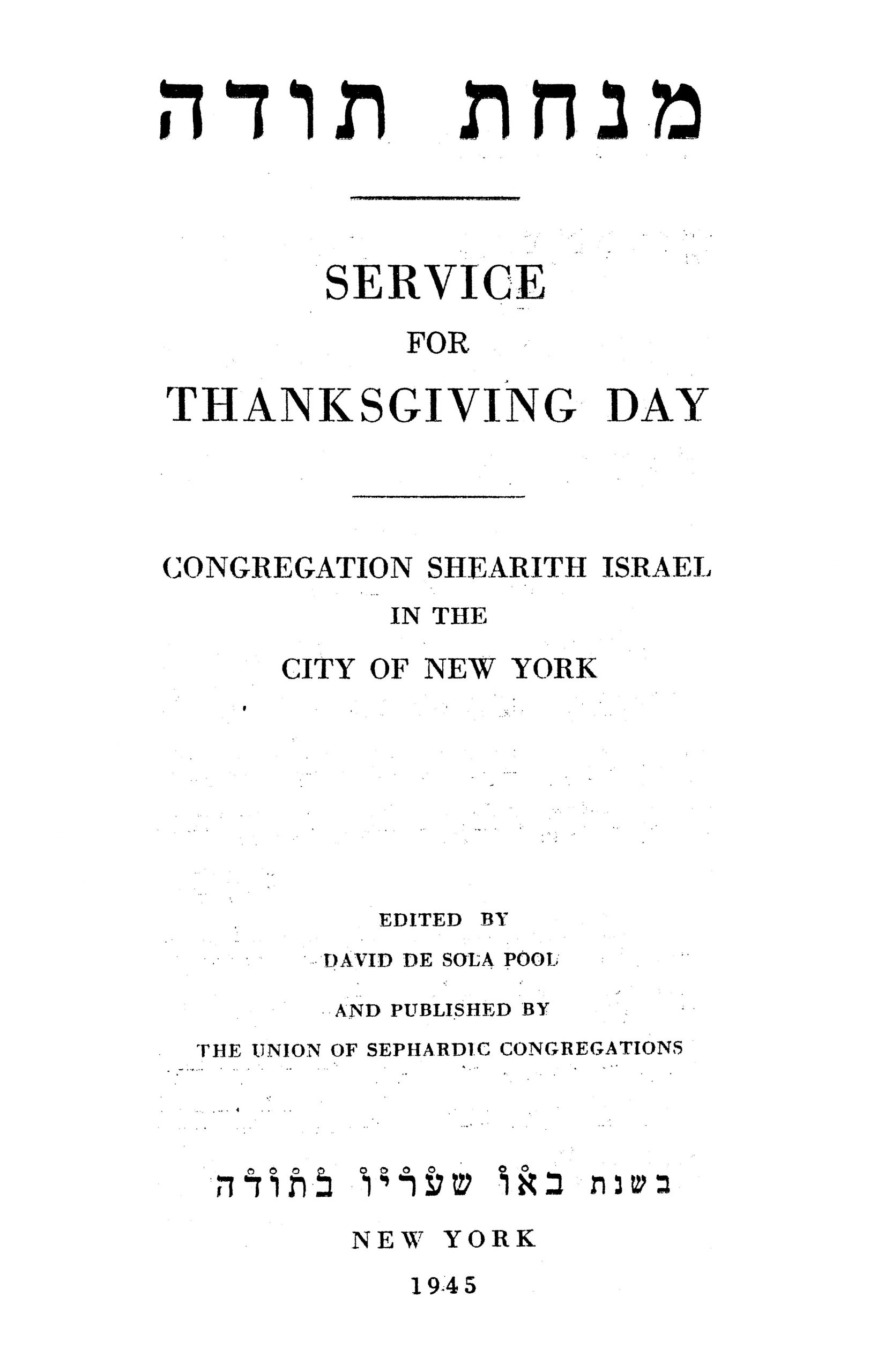| Hebrew | English |
|---|---|
God’s Goodness — the Testament of [Am] Yisrael[1] Israel here refers to the people (Am) of Israel, rather than the State of Israel (Medinat Yisrael). | |
O God, your goodness is manifest in the Testament of Yisrael. From Egypt you redeemed us, O YHVH our elo’ah, and from the house of bondage you delivered us. In famine you have fed us, and in plenty sustained us. From the sword you have rescued us, from pestilence hast you saved us, and from sore and grievous ills you delivered us. | |
With everlasting love you have loved the House of Yisrael, your people; Torah and commandments, laws and judgments you have taught us. Eternal life you implanted in our midst. By your Torah we lived, by your Torah we live now, and by your Torah we shall continue to live and labor for the coming of your Kingdom. | |
Shall we not thank you, O God, on this Thanksgiving Day, for having kept Yisrael alive, for having bestowed on us the gracious gift of your Torah, and for having brought us near to your service? Even as it is written by the prophet: | |
וְאַתָּה֙ יִשְׂרָאֵ֣ל עַבְדִּ֔י יַעֲקֹ֖ב אֲשֶׁ֣ר בְּחַרְתִּ֑יךָ זֶ֖רַע אַבְרָהָ֥ם אֹהֲבִֽי׃ |
But you, Yisrael, My servant, Ya’aqov whom I have chosen, The seed of Avraham my friend,[2] Isaiah 41:8. |
אֲשֶׁ֤ר הֶחֱזַקְתִּ֙יךָ֙ מִקְצ֣וֹת הָאָ֔רֶץ וּמֵאֲצִילֶ֖יהָ קְרָאתִ֑יךָ וָאֹ֤מַר לְךָ֙ עַבְדִּי־אַ֔תָּה בְּחַרְתִּ֖יךָ וְלֹ֥א מְאַסְתִּֽיךָ׃ |
You whom I have taken hold of from the ends of the earth, And called from its uttermost parts, Saying: “You are my servant, I have chosen you, not rejected you;”[3] Isaiah 41:9. |
אַל־תִּירָא֙ כִּ֣י עִמְּךָ־אָ֔נִי אַל־תִּשְׁתָּ֖ע כִּֽי־אֲנִ֣י אֱלֹהֶ֑יךָ אִמַּצְתִּ֙יךָ֙ אַף־עֲזַרְתִּ֔יךָ אַף־תְּמַכְתִּ֖יךָ בִּימִ֥ין צִדְקִֽי׃ |
Fear not, for I am with you, Be not dismayed, for I am your elo’ah; I will strengthen you, yea, I will help you; Yea, I will uphold you with my victorious right hand.[4] Isaiah 41:10. |
אֲנִ֧י יְהוָ֛ה קְרָאתִ֥יךָֽ בְצֶ֖דֶק וְאַחְזֵ֣ק בְּיָדֶ֑ךָ וְאֶצָּרְךָ֗ וְאֶתֶּנְךָ֛ לִבְרִ֥ית עָ֖ם לְא֥וֹר גּוֹיִֽם׃ |
I, YHVH, have called you in righteousness, I have taken you by the hand; I have kept you and made you a covenanted people, A light to the nations;[5] Isaiah 42:6. |
לִפְקֹ֖חַ עֵינַ֣יִם עִוְר֑וֹת לְהוֹצִ֤יא מִמַּסְגֵּר֙ אַסִּ֔יר מִבֵּ֥ית כֶּ֖לֶא יֹ֥שְׁבֵי חֹֽשֶׁךְ׃ |
To open eyes that are blind, To bring captives out of the dungeon, Those who sit in darkness out of prison.[6] Isaiah 42:7. |
“God’s Goodness — the Testament of Israel” by Rabbi Milton Steinberg appears on page 558 of The Sabbath Prayer Book (Jewish Reconstructionist Foundation, 1945) as part of a service for Thanksgiving Day. It is the last of four “testaments,” the other three being the testament of Nature, Man, and America respectively. I have supplied the Hebrew verses corresponding to the vernacular English text provided by Rabbi Steinberg. I have replaced “Lord” with YHVH as the circumlocution for the Tetragrammaton, replaced Anglicizations and other archaisms. –Aharon Varady
Source(s)

Notes

“God’s Goodness — the Testament of [Am] Yisrael, a prayer for Thanksgiving Day by Rabbi Milton Steinberg (1945)” is shared through the Open Siddur Project with a Creative Commons Public Domain Dedication 1.0 Universal license.









Leave a Reply